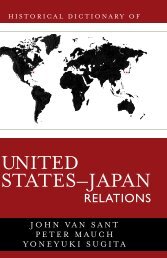Private Academies of Chinese Learning in Meiji Japan: The Decline ...
Private Academies of Chinese Learning in Meiji Japan: The Decline ...
Private Academies of Chinese Learning in Meiji Japan: The Decline ...
You also want an ePaper? Increase the reach of your titles
YUMPU automatically turns print PDFs into web optimized ePapers that Google loves.
THE LEGACY OF THE JUKU 225juku, although dw<strong>in</strong>dl<strong>in</strong>g, still formed part <strong>of</strong> the educationalscene. Thus it was possible for these authors to have spent someyears <strong>in</strong> a juku, especially if they had been educated outsideTokyo. However, only a few authors had clearly done so. On theother hand, most <strong>of</strong> them had a reason to be <strong>in</strong>terested <strong>in</strong> theeducation <strong>of</strong> their day. At least 12 were educators and 2 werepoliticians.It is perhaps not surpris<strong>in</strong>g that they had more <strong>in</strong>terest <strong>in</strong> theeducation system <strong>of</strong> the present than that <strong>of</strong> the past. So whydiscuss juku at all? <strong>The</strong> answer can be found <strong>in</strong> the historicalsituation. As part <strong>of</strong> the <strong>in</strong>creas<strong>in</strong>g state control <strong>in</strong> all areas <strong>of</strong> lifewith<strong>in</strong> <strong>Japan</strong>, the M<strong>in</strong>istry <strong>of</strong> Education too aimed to do its part<strong>in</strong> mobiliz<strong>in</strong>g the people for the nation. Fundamental educationalreform was on the agenda s<strong>in</strong>ce 1935, and <strong>in</strong> 1937 a new <strong>of</strong>fice foreducational matters was created (kyōgakukyoku). 43 That same yearanother commission was created, this time directly under thejurisdiction <strong>of</strong> the cab<strong>in</strong>et. <strong>The</strong> calls for reform had <strong>in</strong>creased, andseveral private associations had produced draft proposals. Nihonoyobi Nihonj<strong>in</strong> published several articles on the subject.<strong>The</strong> general thrust <strong>of</strong> educational reform was towards<strong>in</strong>creas<strong>in</strong>g centralization and ideological <strong>in</strong>doctr<strong>in</strong>ation. At thesame time, the 1930s were a time <strong>of</strong> pr<strong>of</strong>ound structural change.<strong>The</strong> expansion <strong>of</strong> secondary and tertiary education, begun <strong>in</strong> the1920s, still cont<strong>in</strong>ued. <strong>The</strong> system became less elitist, andopportunities for women <strong>in</strong>creased. 44 Thus the education systemwas chang<strong>in</strong>g <strong>in</strong> different ways; <strong>in</strong>creas<strong>in</strong>g state control on theone hand, expansion with egalitarian tendencies on the other.<strong>The</strong>se developments are reflected <strong>in</strong> the articles; the emphasison moral and character education reflects the government’sefforts <strong>in</strong> this area, and the criticism <strong>of</strong> mass education <strong>in</strong>“factories <strong>of</strong> learn<strong>in</strong>g” can be understood <strong>in</strong> the context <strong>of</strong> theexpansion. Strong nationalist rhetoric, however, is rare. In onlyone or two articles is the necessity <strong>of</strong> tra<strong>in</strong><strong>in</strong>g excellent<strong>in</strong>dividuals l<strong>in</strong>ked to <strong>Japan</strong>’s ambitions to become a great power.Thus men who had an agenda concern<strong>in</strong>g educational reformused the theme <strong>of</strong> juku as a pretext for discuss<strong>in</strong>g the issues <strong>of</strong>1938. Some authors explicitly refra<strong>in</strong>ed from relat<strong>in</strong>g personalexperiences, although they were <strong>in</strong> a position to do so. Oneexample is Nakayama Kyūshirō (1874–1961; pr<strong>of</strong>essor <strong>of</strong> orientalhistory at Tokyo Imperial University). He attended a juku <strong>in</strong> hishome town <strong>in</strong> Nagano prefecture, but we learn little about it.













